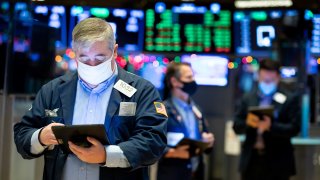
- Wharton School's Jeremy Siegel said Thursday stocks have more room to run even with bond yields moving higher.
- The latest Covid relief bill will be a driving force pushing the market higher, Siegel told CNBC.
- Siegel said he sees stock prices rising an addition 10% to 12% this year.
Wharton School's Jeremy Siegel told CNBC on Thursday he believes stocks will still move higher this year, even in the face of rising bond yields and inflation concerns.
In an interview on "Squawk Box," the finance professor said the $1.9 trillion coronavirus relief package, which President Joe Biden hopes to sign into law Friday, is just "more fuel on the fire, so to speak."
"Eventually there will be a Fed tightening and eventually that tightening is going to pressure stocks, and that fear of that, I think, is beginning to come through now," Siegel said, referencing the choppy equity trading that's taken place in recent weeks as investors digested a rapid increase in the yield on the 10-year Treasury.
"But when I see the amount of stimulus come, I can see another 10% rise in stock prices, 10%, 12% this year then the Fed gets more worried and the leveling off 2022, 2023," Siegel said. "We're going to get those little fears that are coming through, but it's going to be overwhelmed, I think, by the strength of the economy and the rise of corporate earnings," he added.
The Dow Jones Industrial Average closed at a record high of 32,297 Wednesday; a 10% rally from there would put the 30-stock Dow at around 35,530. The S&P 500 closed at 3,898.81 Wednesday, so a 10% gain would put the benchmark U.S. index at nearly 4,290.
Money Report
The yield on the benchmark 10-year began the calendar year below 1%, but it's soared since the end of January on expectations of a strong U.S. economic recovery from pandemic-induced damage, as well as fears of accompanying inflationary pressures. The yield, which moves inversely to prices, traded around 1.5% on Thursday, retreating from one-year highs above 1.6% in recent days.
Siegel, for his part, said he believes pent-up demand being unleashed on the economy — coupled with the dramatic increase in money supply during the pandemic — will continue to drive yields higher and lead to higher inflation.
However, Siegel said he thinks investors will still prefer to be in equities over bonds, particularly those in cyclical sectors that benefit from an economic reopening. The longtime market bull told CNBC earlier this week he believes they will outperform tech stocks in the next six to 12 months.
"Let's assume bonds to go 2.5% or 3%. If in an environment where have a 4%, 5% inflation — which I really think is going to happen — that's still not attractive at all" for investors looking for yield, Siegel said Thursday. "Remember, stocks are still real assets. They're claims on real capital, real ideas, copyrights, intellectual property, etc. They're going to maintain their value in an inflationary environment. ... Dividends go up with inflation."
"If bond yields are rising, you take a double hit," added Siegel. "You have less purchasing power on the bond and the bond price falls, so we can't take advantage today of a bond yield 3% a year from now. It actually makes the bond market that much worse compared to stocks, and that's why the money I think is going to continue to flow into the stock market."






